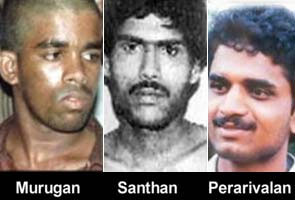murugan,santhan,perarivalan,new delhi,prime minister,rajiv gandhi,supreme court, assassination

New Delhi: The Supreme Court has ruled that it will hear the petitions of three men who are challenging the death sentence given to them for their role in the assassination of former Prime Minister Rajiv Gandhi in 1991.
Weeks before they were scheduled to be hanged in September, Santhan, Murugan and Perarivalan had appealed to the Madras High Court, which stayed their execution.
The trio was sentenced to death by the Supreme Court in 1999. Their mercy petitions, filed 11 years ago asking for their sentence to be commuted to life in prison, were rejected in August last year by President Pratibha Patil.
The convicts had appealed to the High Court against this decision on the grounds that the President's office showed "an inordinate and inexplainable delay" in deciding their mercy petitions, and that this violated Article 21 of the Constitution (Protection of life and personal liberty).
K Venkat, who heads a group affiliated with the Congress, asked for their petitions to be transferred to the Supreme Court because the "surcharged atmosphere" in Chennai would not allow for a fair hearing. The three convicts have turned into a major cause for political parties in Tamil Nadu, who have all appealed for their sentence to be commuted to life imprisonment.
Mr Venkat has also argued that since the Supreme Court is already hearing cases that centre on the delay in deciding mercy petitions, the case of Rajiv Gandhi's assassins should also be moved here.

New Delhi: The Supreme Court has ruled that it will hear the petitions of three men who are challenging the death sentence given to them for their role in the assassination of former Prime Minister Rajiv Gandhi in 1991.
Weeks before they were scheduled to be hanged in September, Santhan, Murugan and Perarivalan had appealed to the Madras High Court, which stayed their execution.
The trio was sentenced to death by the Supreme Court in 1999. Their mercy petitions, filed 11 years ago asking for their sentence to be commuted to life in prison, were rejected in August last year by President Pratibha Patil.
The convicts had appealed to the High Court against this decision on the grounds that the President's office showed "an inordinate and inexplainable delay" in deciding their mercy petitions, and that this violated Article 21 of the Constitution (Protection of life and personal liberty).
K Venkat, who heads a group affiliated with the Congress, asked for their petitions to be transferred to the Supreme Court because the "surcharged atmosphere" in Chennai would not allow for a fair hearing. The three convicts have turned into a major cause for political parties in Tamil Nadu, who have all appealed for their sentence to be commuted to life imprisonment.
Mr Venkat has also argued that since the Supreme Court is already hearing cases that centre on the delay in deciding mercy petitions, the case of Rajiv Gandhi's assassins should also be moved here.











0 comments:
Post a Comment